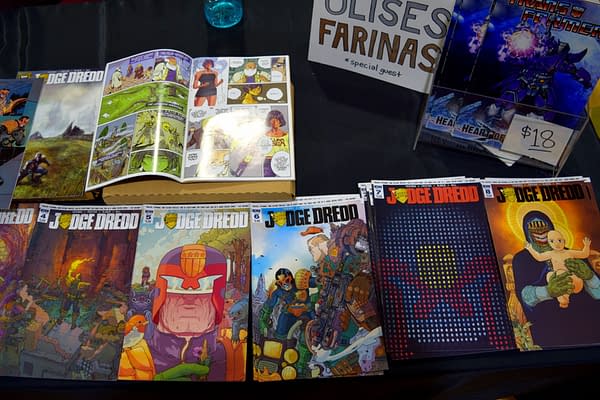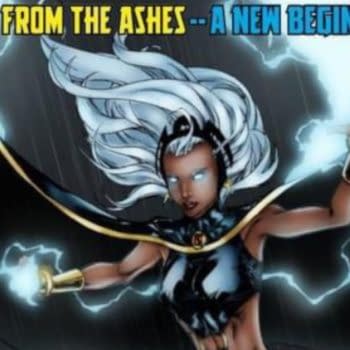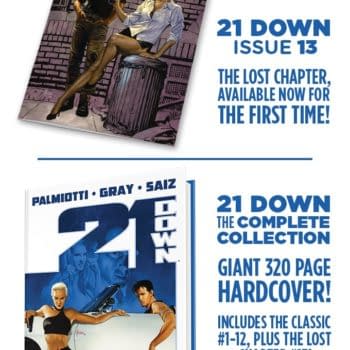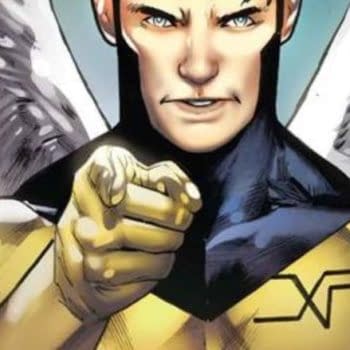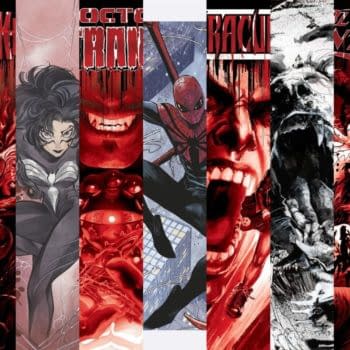Posted in: Comics | Tagged: Comics, diversity, entertainment, marketing, Tactic, ulises farinas
Ulises Farinas On Making Diversity More Than A Marketing Tactic

Ulises Farinas is a cartoonist and writer who meticulously blends genres, styles, and universes. Breaking down the walls between imagination and reality, he depicts super-saturated, hyper-detailed worlds where heroes and monsters are as fantastic as the landscapes they inhabit. Currently writing IDW's Judge Dredd with Erick Freitas, drawn by Dan McDaid. Also with Erick Freitas, he is the co-writer of Amazing Forest, available on Comixology and in print from IDW. He is also the artist and co-writer, of GAMMA, a one-shot comic previously serialized in Dark Horse Presents.
Bleeding Cool: I am sitting at Fort Collins Comic Con speaking with Ulysses Farinas. Just to get us started, what books are you working on right now?
Ulises Farinas: Right now I'm finishing up Judge Dredd for IDW and we just finished Amazing Forest there as well. The trade paperback just came out this past Wednesday. I'm also working on a book called Cloudia & Rex for my own publisher BUÑO, and right now just preparing for the next year, coming up with new pitches and stuff.
BC: Can you tell me a little about your work on the Transformers: Heart Of Darkness? How did you get that job, how did you first get to working with IDW?
UF: With IDW that was actually kind of a funny story. I had looked up a cached version of their website where their submissions policy was still open, because the current website at the time had closed submissions. You couldn't submit anymore. So I found an older website and I emailed them from that email address, and it actually still worked! So I got through to Bobby with IDW and they asked me to work on a Transformers book.
BC: Wow! I have to assume that they fixed that little glitch after that. Let's talk about Judge Dredd for a minute, how did you get that job?
UF: Well I worked on Judge Dredd: Megacity 2. I was the artist on that and I really liked working on that with Douglas Wolk and we kind of got to put our own stamp on Megacity 2. Then afterwards I was still talking to the editors, I wanted to pitch them some ideas I had and they asked me to pitch for the Judge Dredd series, so we got it.
BC: Ok. That seems pretty straightforward. So, The Amazing Forest, can you tell us a little bit about that one?
UF: Amazing Forest is an anthology series. Each issue has 4 stories. It's written by me and Eric Freitas and I started writing it about 2012 or 2013. So a while ago. And it's great to finally see it on shelves. And there is all different amazing artists on each issue. So each story is like the Twilight Zone, or Outer Limits type of dark, weird science fiction type stories. That's pretty much what it's about.
BC: And then can you tell us a little bit about Cloudia & Rex?
UF: Claudia and Rex is about two little girls who are imbued with the powers of almost all the gods from all the different world cultures. So Cloudia herself is not really possessed, but within her is the god Thanatos from Greek mythology (who is the god of death). But he is almost using her as a raft to basically shepherd all these gods who are being killed in their god realm. So it's kind of her coming to terms with this power and also fixing her relationship with her mother after their father passed away.
BC: And then yesterday at your panel, you had spoken a bit about why you started BUÑO and how it was kind of a cry for diversity, could I get you to talk a little about that?
UF: I'm not sure it's a cry for diversity; I think it's making sure that diversity isn't just a marketing tactic. That you actually hire people of color, that you actually hire different people from different walks of life and it's not just "I just made this character a person of color", that you actually care about the comics community itself and making sure there's diversity and that there's value to that beyond just a marketing tactic.
BC: As a publisher, are you looking at other artists and authors submissions, or is it mostly to publish your own stuff?
UF: I am definitely looking at other people's stories. Our first book is Light by Rob Cham who is Filipino artist. I think it's a 100 page graphic novel. So it's not just a clearing house for my ideas, hopefully we'll grow to support many different artists.
BC: All right. What other ideas have you got for your BUÑO publishing aside from Cloudia and Rex, what else is in the future there?
UF: We are also kind of looking into not just publishing peoples work but also maybe distributing much smaller indie publishers, indie artists. A lot of people making books with like Kickstarter and stuff are now trying to figure out how to mail their books and get them to shops and I think personally as an artist that's something that you just don't want to put any time into. It's so draining to be doing all the logistics. So I think its great opportunity right now to possibly step into that and help these artists get their books out into shops and stuff.
BC: It does seem like a lot of Kickstarters have had a rough time with delivery. They go well, they get their funding, people seem interested, but it's the delivery that seems to kick people in the butt.
UF: Yeah, I think Diamond is kind of silly because they are not looking at this potential customer base as anything worthwhile, but so much of the comics economy is being made through Kickstarters. I think there should be someone who almost centralizes that. And if you have a great book, maybe there could be someone who could team up with you to get that out there so you're not stuck with the logistics of moving all this inventory.
BC: Now I remember a few years back there was actually a company called FM that would work with the indie publishers, that would work with the indie guys, and try and get them out there when Diamond wouldn't, and Diamond put them down pretty cold. Yet they are pretty adamant that they are not a monopoly. Would you argue that, do you think Diamond has a monopoly on the distribution?
UF: I think it's obvious. It's like calling the sky green. Everyone knows that Diamond's a monopoly, there's no other way of saying it. Who else is delivering the comics to shops? If Diamond is going to say it's not a monopoly, sure tell me who your largest competitors are. It's a real simple question.
BC: If you had the chance, would you like to grow as a distributor and become that competition? Or would you prefer the company to grow as a publisher?
UF: I would rather grow as a publisher. Distribution isn't a major focus so much as something I know can help with. When it comes to indie creators, when it comes to people of color, when it comes to queer creators, you know there is already so many obstacles in the way that challenge you in trying to get your comics out there. So anything that can help different types of creators get their works out there, I am interested in. Whether I'm publishing it or they are publishing it themselves, I want to create a network that can help them. I think comic book artists work together all the time, they are so much into collaboration. But they do not talk about, they do not think about how they collaborate to help their own interests economically. When it comes to diversity, how do you collaborate – how do you organize so that you help yourself in this market, so you're not just at the whims of these larger companies? Whether it's a distributor like Diamond or it's a larger publisher like say Marvel or DC. I think anything that we can do to work together and to help each other; I think that's what's going to be the change. So we don't have these sad stories of creators begging Hero Initiative to pay for their medical bills. And that's the sad thing, we pay such deference to the creators that have gone by, we call Jack Kirby the King, but we don't actually respect what that means. Because if you really felt they were the king, why do they have to beg you for money? Why do they have to beg just to not die poor, sick, starving? We shouldn't have to go to conventions and see 80 year old, 90 year old cartoonists who should be retired still having to hawk their wares just to break even. I think it's really a disappointment that as creators we don't work together more to prevent that. You know BUÑO is just part of what I think is the solution, creating publishers, creating a mindset. Changing the culture so that we work together and don't have the same problems in 50 years that we have right now, which are the same problems that we've had now for the last 50 years.
BC: A lot of people would argue that it's getting better, but you mentioned yesterday it seems like it's almost getting better because of sensationalism. It's getting better because you can get a headline saying "I hired a black woman", instead of because she was the most qualified. It looks like they are grabbing the headline and not the author. Do you think that the big companies actually care or are they just trying to court public favor?
UF: I think the question is a little weird. When they are hiring a black woman to write say a Black Panther backup I don't think they are doing it just because she is a black woman. We have to be careful to not diminish a person's talents, a person's hard work. Even if they are getting jobs which I find often times to feel like it's pandering. Just because it's pandering doesn't mean the quality of the work is bad. A lot of times a difficult question I get is, when I talk about these things, when I criticize these systems, people often misinterpret that I'm criticizing the creator. If I disagree with Brian Michael Bendis creating say Riri for the Iron Man series, it's not because I care about the quality of the work. It might be an amazing book, he might write an amazing Iron Man story. It is the politics behind it that are in question. When he's saying that "I want to make a character that my daughter can look up to", how can you not ask the question: don't you want someone working at the company that they can look up to? Isn't that more important? SO I think that's something to keep in mind. When it comes to pandering, we have to be careful that we are criticizing the practices; we are criticizing the institutions and not necessarily demonizing the people within these institutions. A lot of times we don't have as much control over whether a corporation is made out of people or the corporation is something separate from the people within the company; it can be impossible to differentiate. So I always try to make sure everyone knows I am talking about the institutions and not the people.
BC: If this philosophy appealed to people reading this, does BUÑO have a submission policy?
UF: Well, my submissions policy, and I said this in another interview before, is the same submissions policy that every company has. If you know someone at the company, you can submit. That's how it always is, and I think it's silly when you see a company making a big hoopla like "our submissions policy is open now". I just think, "I'm pretty sure I submitted a comic last year and it got approved", no one told me like oh buddy, don't talk to me about that submission it's closed right now. No one has ever done that. So I think we should just get rid of that façade that there are these submission policies in the industry. Why put it down or put it up? Just put an email address down there and when you feel like looking for new stuff, open the emails and there will be stuff in there. So my submission policy is, send me anything you want if you know me. Send it to the email address on the website if you want, it's just going to be me looking at it anyway. It's just me and Storm Smith. And, you know, I'll tell you we don't have any money and we can't make it, you know? But when we do have more money, our submission policy will be open. With air quotes around that.
BC: Ok. I guess just a fairly basic question, with all that philosophy in mind, a lot of people in the industry are working to get to the big 2, does that even interest you?
UF: Yeah, I'll definitely work for the big 2; I'll work for anyone who will pay me. If a company pays you fairly and respects you as a creator, why wouldn't I work for them? I have philosophical disagreements with the entire comic industry, not just Marvel, not just DC, but also Image, Top Shelf, with FirstSecond, with Fantagraphics, it doesn't matter, and I'm just naming publishers that don't even matter, with Oni, any of them. I'm doing books with Oni; I'm doing books with IDW. I've done books with almost every major publisher. I have philosophical disagreements with them, but if my relationship with an editor or with a publisher is fair and they treat me with respect, then I will work with them. I will still voice my disagreements with their practices. I think that the industry shouldn't act so afraid of their creators voicing their grievances. If you say you know comics are for everyone, and comics are great and everyone should be reading them, then we should be listening to the people making the comics. They might have a good idea on how to make comics better.




